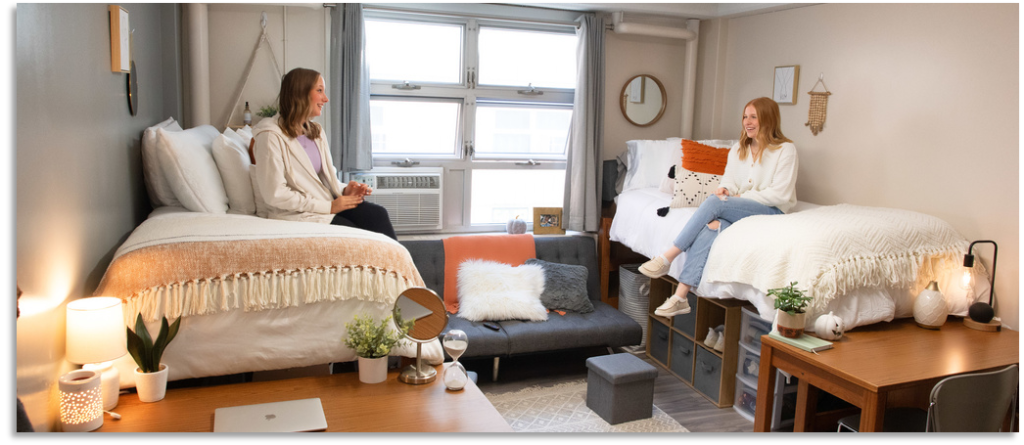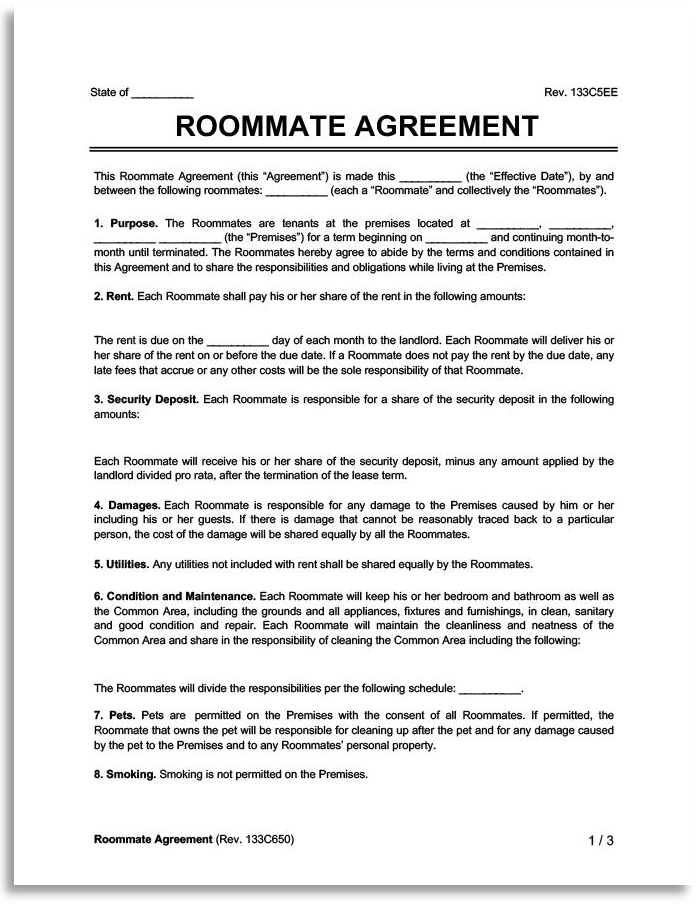Nervous about having a roommate
Being nervous about having a roommate is normal, especially if it’s your first time sharing a living space with someone. To ease your concerns, consider having an open and honest conversation with your roommate to establish boundaries and expectations. This can prevent potential conflicts and ensure a more harmonious living arrangement. Remember that many people have successful and positive roommate experiences, which can lead to meaningful friendships and shared experiences. Please take the opportunity to get to know your roommate, communicate openly, and give it some time to adapt to the new living situation. Over time, the nervousness may fade, and you could even find a supportive and enjoyable living arrangement.
There are also some pros and cons about having a roommate. On the positive side, sharing living expenses is one of the most significant benefits. Splitting rent and utilities can make housing more affordable. Additionally, having a roommate can provide companionship and emotional support, reducing feelings of loneliness. It can also lead to shared responsibilities, making chores and daily tasks more manageable.
On the contrary, conflicts may arise from differences in lifestyles, habits, or cleanliness standards. Privacy might be limited, and personal space can be compromised. Furthermore, roommates can sometimes lead to noise and disturbance, potentially affecting your ability to concentrate or relax.
Living costs are higher when living alone. When you have no roommate to share expenses with, you bear the full burden of rent or mortgage, utility bills, and other living costs. Everything can be more expensive, from housing to groceries, without a roommate to split the expenses. Though living alone provides privacy and independence, it often comes at a premium, making budgeting and financial planning more challenging. Sharing living costs with a roommate can be a practical solution for those looking to reduce their financial strain and increase their savings.
Compromising with your roommate is a crucial aspect of maintaining a harmonious living arrangement. It involves finding a middle ground and being flexible to accommodate each other’s needs and preferences. Effective communication is crucial, whether about sharing chores, respecting quiet hours, or managing shared expenses. Listen to your roommate’s concerns, express your own, and work together to reach mutually agreeable solutions. The ability to compromise can help prevent conflicts and create a more positive and cooperative living environment for you and your roommate.
Nervous about having a roommate
Having a roommate or becoming one can be a tense experience. The persistent questions that run through your mind are endless. Will you choose the right person who shares your values and habits? Will they keep the shared space tidy or become a slob? Will you get along with them, or will your personalities clash, making daily life difficult? Perhaps most concerning, will they respect your privacy? Individuals face these common anxieties when considering or embarking on the roommate journey.
Despite the anxieties that may accompany the decision to have a roommate, there are compelling reasons to embrace this idea. Sharing your living space with someone else can significantly ease the financial burden, making it easier to manage bills and rent. Beyond the financial benefits, having a roommate can lead to lasting friendships. It’s not unusual for roommates to become good friends, and in some cases, even lifelong companions, sharing life’s experiences and adventures.
Feeling nervous about having a roommate is a common reaction, as change is rarely easy. However, it’s important to remember that the benefits of having a roommate can be numerous. Roommates do not just share the financial burden. They can also assist in keeping the apartment clean and organized, which eases the workload and promotes a more pleasant living environment. Moreover, having a roommate opens the door to the potential for friendship and shared experiences, among many other advantages. Although agitations about change are natural, embracing the positive aspects of having a roommate can make the transition a rewarding experience.
Traversing into the world of roommates involves a delicate balance between concerns and opportunities. It’s perfectly normal to feel nervous about the potential pitfalls, but it’s equally important to recognize the advantages. Open and honest communication with your prospective roommate can help address your concerns and establish boundaries, ensuring a more harmonious living arrangement. While the fear of making the wrong choice is real, the prospect of sharing the costs and joys of life with a compatible roommate can often outweigh the initial worries, making it a decision worth considering.
One of the most widely discussed advantages of having a roommate revolves around finances. Roommates can significantly reduce the cost of living. When you have one roommate, you can expect a 50% reduction in expenses; with two roommates, that savings can increase to 60%. Sharing rent and utility bills can make housing more affordable, which is particularly appealing in a world where living costs are consistently rising.
Beyond those financial perks, a good roommate relationship can provide emotional support. Roommates can help you combat loneliness, offering companionship and someone to talk to at the end of a long day. They can also lessen boredom by providing opportunities for shared activities and social interaction, making the living situation more enjoyable and less tiresome.
In addition, having a roommate offers opportunities for personalizing and decorating shared spaces. Collaborating with your roommate on decorating decisions can be a fun and satisfying experience. It allows for the infusion of different styles and ideas, turning your living space into a unique and creative reflection of your personality. This shared creativity can create a more aesthetically pleasing and comfortable living environment for everyone involved.
Addressing common concerns
Privacy concerns are common when sharing a living space with a roommate. To alleviate these worries, it is crucial to establish clear boundaries and maintain personal space. In direct conversations with your roommate, open communication sets the stage for a clear understanding of expectations and personal boundaries. So, initiate honest conversations with your roommate to discuss your expectations and concerns. Creating a roommate agreement, a written document that outlines rules and expectations can help avoid misunderstandings. In this agreement, determine the shared expenses clearly and consider using cost-auditing tools or apps to ensure transparency. It is also essential to respect each other’s personal space, maintaining privacy and boundaries. Establish a fair chore schedule to save on cleaning costs, which can be an area for misunderstanding.
Setting clear guidelines for visitors is essential when sharing a living space with a roommate. Not only does this help control expenses and ensure comfort, but it also promotes harmonious living. To enhance the effectiveness of your guest policy, consider documenting everything. Keeping records of expenses, agreements, and communication regarding shared living expenses can prevent misunderstandings and financial conflicts. Additionally, emphasize the importance of having alone time beforehand. This open dialogue ensures that you and your roommate are on the same page regarding privacy and personal space. By documenting, communicating, and establishing these guidelines, you can create a living arrangement that manages costs effectively and fosters a positive and cooperative environment.
The key to a successful roommate relationship lies in compatibility. To find a compatible roommate, consider using roommate-finding apps or websites that match individuals based on lifestyle preferences. These platforms help connect you with people with similar habits and interests, increasing the likelihood of an amiable living arrangement.
Open communication is the most important in fostering a positive roommate relationship. Emphasize the significance of discussing expectations and concerns before moving in together. This includes having honest conversations about topics such as illness or the potential loss of a job, which can significantly impact your living situation. You can build a strong foundation for a cooperative and understanding roommate by addressing these matters openly and dynamically.
Maintaining a clean and organized living space is essential for a positive roommate experience. Practical strategies for managing chores and cleaning schedules can make this task more manageable. Consider using a sample chore chart that outlines specific tasks and their frequency to provide a visual reference for shared responsibilities. To ensure a fair division of tasks, it is important to communicate openly with your roommate about each person’s strengths, preferences, and availability. This conversation can help create an equal distribution of responsibilities, preventing potential conflicts and promoting a cleaner and more pleasant living environment. Additionally, setting clear expectations regarding cleaning standards and schedules and discussing how to handle any special circumstances or emergencies can further contribute to a smooth and cooperative living arrangement.
Noise and Lifestyle differences
One of the common challenges when living with a roommate is navigating differences in noise levels and lifestyles. To foster a peaceful roommate environment, finding ways to compromise and discover common ground is necessary. First, suggest using noise-canceling headphones, particularly if one roommate’s activities or habits might disrupt the other’s need for silence. These headphones can be an effective solution for minimizing disturbances while still allowing individuals to enjoy their preferred activities. Moreover, agreeing to quiet hours can help address lifestyle differences. Setting specific times during the day or night when both roommates reduce noise levels can provide a structured approach to ensure peace and tranquility during crucial times like studying or resting. This agreement might include factors like when to turn down the volume on entertainment systems or refrain from engaging in noisy activities, ultimately promoting understanding and respect for each other’s lifestyles and preferences. Finding common ground regarding noise and lifestyle differences is key to establishing a positive and cooperative roommate relationship, allowing both individuals to live comfortably.
Preparing for roommate life
Before embarking on the roommate journey, it is essential to take specific preparatory steps to ensure a smooth inhabiting experience. One crucial aspect is creating a comprehensive roommate agreement. This document outlines the specifics and particulars of what should be included in the agreement, covering key areas such as rent and utilities, shared chores and cleaning responsibilities, and policies concerning guests. These elements, clearly defined in writing, will be a vital reference point for both roommates and prevent potential misunderstandings. It’s important to emphasize that both parties should write and sign the agreement to promote accountability and mutual understanding from the beginning. Preparing in this way can set the stage for a more harmonious living experience for everyone involved.
Effective communication is the cornerstone of a successful roommate relationship. Consider implementing a few tips to foster open and positive communication with your roommate. These tips may include guidance on active listening, which involves a true emphasis on what your roommate is saying and responding thoughtfully. Additionally, it is important to emphasize addressing conflicts calmly and constructively to find common ground to resolve issues.
Shared living spaces require thoughtful organization to prevent conflicts and ensure a comfortable cohabitation. Suggestions for dividing and organizing shared areas can be beneficial. These suggestions may include providing ideas for splitting common areas, like the living room and kitchen, to avoid conflicts over space and belongings. Implementing these strategies can promote a harmonious and organized living environment that caters to both roommates’ needs and preferences, leading to a more pleasant shared living experience.
It’s not rare to feel anxious about having a roommate, especially if it’s your first time. To ease these anxieties, consider the success stories of individuals who, despite their initial reservations, found exceptional roommates and enriching living experiences. Sharing anecdotes or quotes from these individuals can provide inspiration and reassurance. By highlighting these positive outcomes, you can instill confidence in readers about the potential benefits of sharing their living space.
Encourage aspirants to shift their focus toward the positive aspects and personal growth opportunities of having a roommate. Living with someone else can teach valuable life skills, from communication and conflict resolution to sharing responsibilities and resources. Emphasize how these experiences can enhance interpersonal relationships and contribute to personal development. Through adopting this positive mindset, room aspirants can approach roommate living as a chance for growth and enrichment rather than as a source of anxiety.
Addressing the inevitable stress and anxiety related to change is essential. Offer practical tips for managing these emotions, including relaxation techniques such as deep breathing or mindful exercises. Additionally, I suggest seeking support from friends or professional counselors if the nervousness becomes overwhelming. By providing these coping strategies, you can help first-timers to effectively manage their stress and anxiety, making the transition to having a roommate a more manageable and enriching experience.
Conclusion
Being nervous about having a roommate can be temporary in entering an independent life, but various advantages benefit this idea. One of the most significant advantages of having a roommate is its financial relief. Sharing living expenses, such as rent, utilities, and groceries, can substantially reduce the overall cost of living. With a roommate, you can split these expenses, making them more affordable. This can be particularly valuable in expensive housing markets where rents are high. Roommates also offer the potential to share the cost of furnishings and household items, further lowering the financial burden. These financial benefits can free up resources for savings, investments, or other personal goals, making it an appropriate option for those looking to manage their expenses effectively.
Beyond financial considerations, having a roommate can provide companionship and valuable social support. Roommates can be a source of emotional and social interaction, reducing loneliness or isolation. They offer opportunities for shared experiences, whether cooking meals together, watching movies, or even going out. Many roommate relationships evolve into friendships; some can even lead to lifelong bonds. This social aspect of having a roommate can enhance one’s overall quality of life by providing a sense of community and support, making it an appealing option for those who enjoy the company of others and the potential for building meaningful relationships.
Being cautious when selecting a roommate ensures a harmonious living situation. Your choice of a roommate can significantly impact your daily life, so it’s crucial to choose a responsible and sensible roommate:
- Consider compatibility in terms of lifestyle, habits, and values. You should have an open and honest discussion about expectations, including issues like cleanliness, quiet hours, and financial responsibilities. This transparency can help identify potential conflicts and allow you to address them proactively.
- Conduct background checks and gather references when possible. This extra step can provide valuable insights into your prospective roommate’s history and character.
- Trust your instincts.
If something doesn’t feel right during the selection process, it’s better to keep looking for a roommate who aligns with your preferences and lifestyle.
Additionally, prioritize safety in your roommate selection process. Share your living arrangement plans with a trusted friend or family member, and consider meeting potential roommates in a public place first to ensure your comfort and safety. By exercising caution and thorough consideration, you can increase the likelihood of finding a compatible and trustworthy roommate, leading to a more positive living experience.






